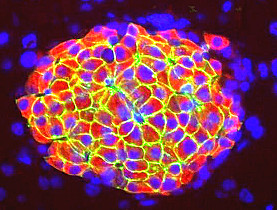Green revolution reaches laboratories

Toxic waste, disasters and pollution have tarnished chemistry’s reputation, but scientists and companies are increasingly trying to work “cleanly”.
Underlying this move towards “green chemistry” are ethical, ecological and economical considerations – and concern for firms’ corporate image.
Chemistry is the science of transforming matter by creating new molecules. These form the basis of our medicines, our clothes, our food and drink and a host of things that have become so commonplace that people no longer give them any thought.
But these vital chemical reactions only succeed under specific conditions. Pressure, temperature and energy have to be just right, and they usually take place in a liquid environment – a “soup” which isn’t always favourable for living organisms or the environment.
If chemistry uses such toxic substances, it’s generally because it doesn’t have any choice. At least not yet…
“Nowadays, one can synthesise virtually any molecule,” Christian Bochet, professor of chemistry at Fribourg University, told swissinfo.ch.
“So rather than resting on our laurels, it’s time to raise our game. We know how to make molecules, so let’s work out how to make them cleanly.”
Question of consistency
Bochet, a specialist in inorganic chemistry and carbon compounds, the basis of many medicines, works with light to create molecules.
Several processes from this field, known as organic photochemistry, are already used in industry to produce nylon, rose oxide and certain herbicides.
In their experiments, Bochet and his colleagues try to use light from the sun rather than from lamps, which use energy that is basically non-renewable.
It is a question of consistency for a researcher convinced that “one can’t go on for ever endangering the environment”, who said “common sense” led him to green chemistry.
Whiff of sulphur
A common sense that the manufacturers of chemical products appear to share.
“People in industry have been talking about green chemistry for a long time,” Richard Gamma, vice-president of the Swiss Society of Chemical Industries, the national umbrella organisation of the chemical and pharmaceutical industry, told swissinfo.ch.
“As there isn’t an exact definition, we prefer the term ‘durable chemistry’, which applies equally well to the process of production as to the products themselves.”
Christian Bochet confirms this change, undertaken more than 20 years ago by a sector whose reputation for a long time had had a whiff of sulphur about it.
“I think the trend is now inevitable. Respecting the environment is fundamental, but it’s also economical. Dealing with waste is very expensive for companies. And then, it’s also good for their image.”
100 per cent clean?
The fact remains however that chemistry continues to frighten people. “Those who are fundamentally against chemical products will never see them as ‘green’,” according to Gamma.
“People often think that natural equals good and synthetic equals bad. But there are loads of counter-examples,” said Bochet, citing poisonous mushrooms and botulinum toxin (botox), the most toxic poison known to scientists, which is produced entirely naturally by bacteria.
He points out that saying one is “anti-chemistry” simply doesn’t make any sense because humans are chemistry: everything around us, from the earth to the air and indeed our flesh and blood is the result of the transformation of matter, i.e. chemistry.
“You can, however, be against its harmful industrial usage,” he said. “It’s clear that a number of industries have abused chemistry for purely economic ends. This includes exporting certain processes, known for being very dangerous, to countries that are less exacting than us. That is obviously absolutely unacceptable.”
Bochet said it was a top priority to stop those cases but nevertheless believes it is possible to have a chemical industry that is 100 per cent clean – “but maybe only a few centuries down the line”.
The large-scale industrial preparation of chemicals has traditionally required the use of toxic substances and/or massive amounts of energy.
Recently a new trend, called “green chemistry”, has emerged, which aims at using environmentally harmless products, and avoiding the release of toxic waste in the synthesis of the chemicals.
To minimise the energy needed for the activation of reagents, much effort is spent on the development of new catalysts, following the example of nature which uses enzymes to accomplish biochemical transformations which would otherwise never take place under ambient conditions.
(Source: The Bochet Group)
2011 has been declared International Year of Chemistry by Unesco, the United Nation’s science agency, and the International Union of Pure and Applied Chemistry.
On February 14 swissinfo will launch an exclusive multimedia dossier looking at the central role Switzerland plays in the chemical and pharmaceutical industry and analysing the challenges facing a historically dirty sector in an increasingly green world.
Under the unifying theme “Chemistry – our life, our future”, International Year of Chemistry 2011 will offer a range of interactive, entertaining, and educational activities for all ages. It is intended to reach across the globe, with opportunities for public participation at the local, regional and national level.
(Adapted from French by Thomas Stephens)

In compliance with the JTI standards
More: SWI swissinfo.ch certified by the Journalism Trust Initiative















You can find an overview of ongoing debates with our journalists here . Please join us!
If you want to start a conversation about a topic raised in this article or want to report factual errors, email us at english@swissinfo.ch.